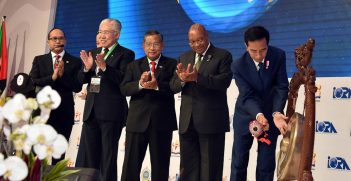And They all Came Tumbling Down: Brazil’s Spiralling Political Corruption Scandal

Following tense protests on 13 March, Brazil’s former President Luiz Inacio Lula was named current President Dilma Rousseff’s chief of staff, potentially giving him immunity against corruption allegations. This story took another twist when Lula’s appointment was suspended by Judge Itagiba Catta Preta Neto.
In recent weeks the German newspaper Die Zeit and magazines such as Americas Quarterly have taken to remarking that Brazilian politics is now more interesting than the TV series House of Cards. Just as the viewers binge-watching season four on Netflix are constantly left guessing what is coming and what impossible political machination is next, members of the Brazilian public now seem completely bamboozled and immune to shock and scandal. All they know for sure is that something is rotten in Brasília. More than three million people took to the streets on Sunday 13 March to call for president Dilma Rousseff’s impeachment. Tellingly, many of those interviewed also expressed little hope that her replacement would be any better; the main opposition leader Aécio Neves and São Paulo governor Geraldo Alckmin quickly retreated from the protests after the crowds turned on them with shouts of ‘Thieves! You’re also thieves!’
While Brazilian democracy is not at risk, the country’s politics and institutions are in a severe state of crisis. The details of the Petrobras corruption scandal, known as Lava Jato, are well-known even in the English-language press. What matters for the institutional paralysis gripping Brazil is the politicised nature of the corruption uncovered by federal judge Sergio Moro. Billions of dollars were siphoned from Petrobras contracts into the coffers of the ruling Workers Party (PT) and main coalition partners such as the PMBD (Party of the Brazilian Democratic Movement). All of this was run through a complicated system of kickbacks involving Brazil’s giant civil engineering firms (the empreiteiras), companies with global reputations such as Odebrecht, Queiroz Galvão, Andrade Gutierrez and OAS.
The corruption process is remarkably simple. Brazil’s construction companies have become some of the largest in the world by feeding on a steady diet of major domestic infrastructure projects such as Petrobras refineries, Eletrobras dams, World Cup sports stadiums and other less controversial projects such as roads, sewers and airports. To keep the gravy train rolling the empreiteiras made the sort of massive legal political donations common to most democratic systems – approximately 80% of the donations to the major political parties come from just a handful of corporate entities. As these were not enough to keep the political machines running, alternate financing avenues were established, literally delivering suitcases of cash skimmed from construction contracts to party financiers and former Petrobras directors indicated by political apparatchiks. The typical take was 3-5% of a given contract, totaling an estimated USD3.5 billion. Nearly everyone of political note in Brazil now seems to be implicated.
So far nobody appears to be immune from investigation. On 3 March 2016 the Ministério Público of São Paulo issued a coercive testimony order that saw former president Lula handcuffed and transported to a Federal Police office at Guarulhos Airport for a four-hour long interview. While other ex-presidents in Brazil have had similar interviews, none has had to endure physical seizure and detention, something Lula protested was entirely unnecessary. The response from Dilma was swift. She flew to his side in São Paulo and has now offered him a position as a “super minister” in her government, which would potentially give him immunity from prosecution. Beyond saving her patron, the hoped for pay-off for Dilma is simple, but perhaps impossible: Lula must save her government and the legacy of the PT.
On Wednesday 16 March, Lula took Dilma up on her offer, but reportedly with conditions. First, he agreed to become a sort of “super minister” – some call it a “minister of hope” – provided he is left free to run political relations with the party base as he sees fit. Second, he is insisting Dilma change her economic policies to match his vision of the medicine needed to bring Brazil out of a historically deep and lengthy recession. Finally, he demanded the right to name other key members of Dilma’s cabinet, potentially including the minister of foreign affairs and the Central Bank head. Technically Lula is still subservient to elected president Dilma and serves at her pleasure, but in practical terms this relationship is not so clear. As of publication of this article Lula had yet to be sworn in, leaving space for his arrest in the interim or a rescinding of the offer.
Much of what is going on in the Lava Jato affair would make Francis Underwood proud. Appointing Lula to cabinet is seen by many critics as a desperate effort to keep him out of jail. In a bizarre and apparently retaliatory intervention judge Moro responded to Lula’s rescue by releasing wire-taping transcripts of telephone conversations between Dilma and Lula from earlier in the week that seem to suggest the president was actively trying to suborn the work of the judiciary with her offer of a cabinet position. No mention was made of whose phone was tapped. Was it Lula’s, now a private citizen, or was it sitting president Dilma’s? The answer is not terribly important because only the Supreme Court is authorised to monitor a president’s telephone conversations, not federal judges such as Moro. More fuel may await the swirling controversy.
While the Lula/Dilma story is getting the most attention, it is really just one sub-plot of the larger story. The political investigations, manipulation of legal processes and spin by the various aspirants to the presidency are breathtaking in their transparency and dispiriting in their abdication of republican spirit in favour of personal interest. The extent to which this sort of cynicism is embedded in Brazilian politics became clear this week when details were released of Senator Delcídio do Amaral’s plea bargain with federal prosecutors. In his 242-page confession he implicated nearly every significant figure in Brazilian politics. He was clear that Lula, Dilma and their coterie knew how Petrobras was being used to advance their political plans. Moreover, Delcídio claims the opposition was in on the act, with de facto leader Aecio Neves himself benefitting from illegally diverted funds.
The details of Delcídio’s sentence point directly to the nature of the crisis afflicting Brazilian politics. His sentence will ultimately be limited to a maximum of fifteen years in prison, but for the next eighteen months he is on a day release program so that he may leave preventative detention in prison and return to congress each day to fulfill his duties as a Senator of the Republic. For the millions protesting on 13 March this is precisely the problem. In practical terms Brazilian politicians are almost completely unaccountable: almost a third in congress are under criminal investigation, which is perhaps understandable given that the integration of economic interests into political processes means that corruption and public malfeasance are almost unavoidable for anyone with ambition for federal elected public office. The pattern is as old as the capital Brasília, which allowed the rise of the empreiteiras at the centre of today’s crisis by feeding them a steady diet of fat contracts that were in turn used to fund the ambitions of the country’s political elite. The Lava Jato crisis is simply more of the same, only it now threatens to tear down the Republic it helped build.
The institutionalisation of political corruption in Brazil appears to be so bad that it quite literally seems like only clowns keep their noses clean and serve the public interest. At first derided as a joke, the professional clown Tiririca was the only member of the Chamber of Deputies to attend all of the sessions from 2011-2014. While likeable and diligent, Tiririca has neither the skill set nor the standing needed to rescue his country. Indeed, as some observers have noted, during past crises Brazil has always had a small but critical group of statesmen standing apart from the fray and shining a light on the path forward. The problem now is that Brazil lacks not just political leadership unstained by corruption, but credible statesmen able to come forward and offer a positive vision for the future. Brazil’s house of cards is tumbling down, and the collapse still looks to have a long way to go.
Dr Sean Burges is the Deputy Director of Australian National Centre for Latin American Studies at the Australian National University. Dr Fabrício H. Chagas Bastos is a lecturer in international relations and Latin American studies at the Australian National University. This article is published under a Creative Commons Licence. It may be republished with permission.





